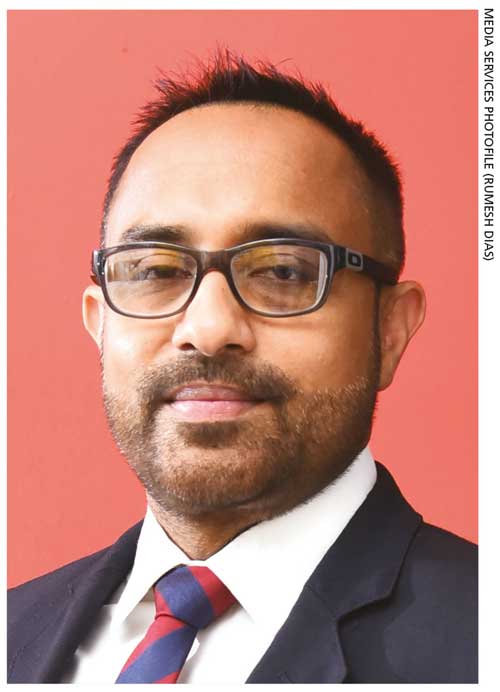FINANCIAL SERVICES
Compiled by Yamini Sequeira
NAVIGATING THE DOWNTURN
Ransith Karunaratne calls for a commitment to long-term financial stability

Q: What challenges is the financial services industry presently facing?
A: The economic crisis posed unprecedented challenges including a rapid deterioration of the quality of financial assets.
This was primarily driven by financial difficulties and severe cash flow constraints experienced by SMEs and the retail sector.
As such, the risk of loan defaults and non-performing loans (NPLs) escalated, necessitating higher provisions for impairments.
And a substantial increase in financing costs directly impacted the industry’s profitability. Asset repricing occurred at a slower rate, exacerbating the strain on financial institutions.
These challenges had a cascading effect on reserves and in certain cases, led to the erosion of capital and capital adequacy ratios. Simultaneously, the industry was confronted by liquidity challenges aggravated by the economic downturn and looming uncertainties.
The diminishing availability of conventional sources of refinancing compounded the intricate issues facing financial institutions.
Q: So how has the industry tackled these challenges?
A: The industry’s resilience can be attributed to several critical factors including the robust governance and supervision framework established by the Central Bank of Sri Lanka, high levels of liquidity and capital adequacy, well-structured ownership and management systems, effective risk management practices and sound credit operational procedures.
These initiatives have collectively empowered the industry to manage credit losses and navigate turbulent times. And open communication with all stakeholders has been a fundamental aspect of fostering trust and transparency during periods of uncertainty.
Q: What’s your take on prospects of an economic recovery?
A: There is no quick fix. Every citizen must be prepared to endure the hardships that accompany an economic recovery. The journey towards long-term financial stability and sustainable economic growth is an evolving process that demands unwavering commitment.
The proposed reforms are imperative as we’ve been operating with subsidies for an extended period.
Nevertheless, it appears that the burden of these issues, essentially stemming from decisions made by the elite, is falling disproportionately on lower segments of society.
This is evident in the local debt restructuring process where a large share of the burden will be borne by superannuation funds.
The government and international community must seek a workable balance between implementing critical economic and financial reforms while ensuring that the people’s needs are met.
Corrective actions – including tax hikes, reductions in fuel and electricity subsidies, efforts to revive public enterprises and initiatives to stimulate tourism – have led to a degree of short-term financial and economic stability.
But a genuine transformation will only occur when economic activities resume, accompanied by an upsurge in exports and tourism. Subsequent growth in foreign reserves and lower inflation will lead to higher disposable incomes and enhanced cash flows for the general public.
Q: With resource sustainability becoming a key priority, what must corporates focus on?
A: Implementing national policies is paramount to driving sustainability initiatives. It’s crucial for businesses to embrace a sustainability oriented approach where such principles are seamlessly integrated into corporate strategies.
Despite Sri Lanka’s potential limitations in the context of global competitiveness due to economies of scale, there’s an opportunity to reposition the country.
This realignment is in response to the growing global emphasis on environmental sustainability and reduction of carbon footprints. A prime example is the EU’s plan to ban ‘fast fashion’ by 2030, offering a valuable opening for Sri Lanka’s apparel giants who are transitioning towards sustainability.
The financial services industry is positioned to support ‘green industries’ that prioritise sustainability – including sustainable apparel, renewable energy, electric and hybrid transportation, ecotourism, and organic and precision agriculture, as well as water supply, sewerage and waste management.
Moreover, the industry is taking measures to reduce its carbon footprint by adopting renewable energy sources, fostering a paperless work culture, optimising resource utilisation and minimising waste.
Q: How do you see the industry performing in financial year 2023/24?
A: The journey to recovery is strewn with hurdles and complexities. While the domestic debt optimisation (DDO) process is nearing completion, uncertainties continue to cloud the restructuring of foreign currency sovereign debt.
It’s worth noting the Central Bank governor’s leadership, maturity and skills in steering the country towards financial stability – they earned him a place among Global Finance’s top governors.
Amid these persistent challenges, the financial services industry has not only endured but also demonstrated resilience. These experiences have fortified it, instilling a resolute determination to play a central role in propelling an economic revival.




